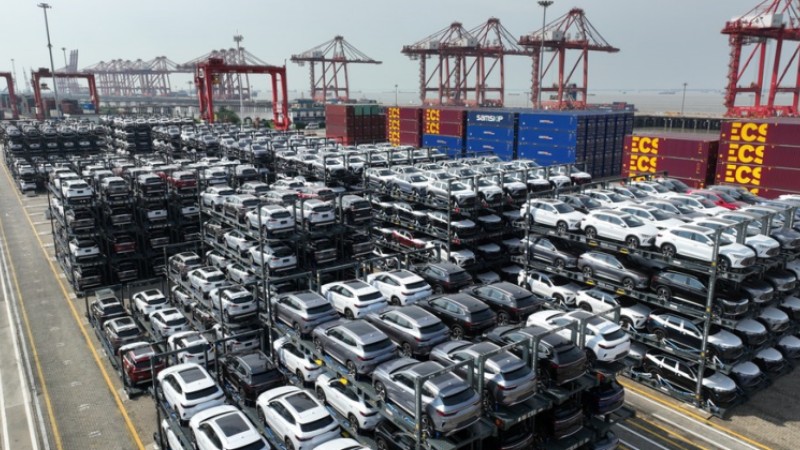China's smart transportation systems enhance convenience

A Didi autonomous driving vehicle runs on a street in Huadu District of Guangzhou, south China's Guangdong Province, March 27, 2023. (Xinhua/Liu Dawei)
From city streets to intercity expressways, intelligent transportation systems are transforming how people get around in China. As the integration of information technology (IT) with the transportation sector deepens, a continual wave of innovative products and business models is emerging, enhancing people's travel experiences across the country.
Enhanced travel services
This summer, people in China have discovered map apps that can display shaded "sun protection" routes for pedestrians in real time, automatically recommending a shady route based on the user's destination.
"By leveraging remote sensing technology, our app can intelligently identify the distribution density of trees around roads and calculate the dynamic light and shadow conditions of road sections based on specific location factors," explained an executive from Amap, a leading Chinese mapping service provider.
Meanwhile, navigation apps now provide countdowns to traffic light changes for drivers. Bike-sharing systems recommend available parking spots on congested streets. Additionally, computer vision technology at highway toll booths enables seamless fee collection, allowing vehicles to pass without stopping.
Ride-hailing services are also experiencing advancements. To improve the efficiency of matching supply with demand, Amap has developed an "AI balancer" system. This system leverages big data to predict congestion and adjust pricing, according to Li Xinhua, the general manager of the taxi division of Amap's ride-hailing services.
IT is playing a vital role in enhancing bike-sharing experiences in China.
"How many bikes should we distribute across parking spots? We used to rely on manual counts, which was inefficient," remarked Huang Binqiang, an executive in the technology department of Chinese bike-sharing service provider Meituan Bike. The company can now predict user demand and dispatch bikes in real time by employing deep-learning models. This innovation ensures convenient services for users and helps maintain smooth traffic flow, Huang added.
Recent data released by China's Ministry of Transport (MOT) provides insight into the growing trend. Over 300 Chinese cities currently offer ride-hailing services, processing more than 25 million daily orders, and a total of 15 million shared bikes have been deployed across the country, generating over 28 million orders daily.
Smoother, more efficient traffic flow
Intelligent systems are revolutionizing not only travel experiences but also the efficiency and smoothness of city operations, particularly in traffic management.
"Rapid economic development has stimulated more demand for transportation, while challenges like congestion, accidents, and pollution have become increasingly prominent," observed an official from the science and technology department of the MOT.
According to the official, IT — particularly artificial intelligence (AI) — is opening new avenues to enhance the service capabilities of transportation infrastructure.
In the Beijing Economic-Technological Development Area (E-Town), the construction and transformation of intelligent facilities have led to notable success in alleviating traffic congestion. By enabling dynamic adjustments of traffic signals based on real-time vehicle flow at 332 intersections, the area has reduced queue length by 30.3 percent and unnecessary green light time by 18.33 percent in relevant zones.

An autonomous vehicle is in driverless test on a road in Yizhuang of Beijing, capital of China, Oct. 19, 2021. (Xinhua/Peng Ziyang)
The Xiangyang Hi-Tech Industrial Development Zone in central China's Hubei province has taken strides in autonomous driving services. Covering over 140 application scenarios involving the Internet of Vehicles (IoV), 234 intersections, and 510 kilometers of two-way roads, these services now extend within a large-scale city-level application area of 150 square kilometers, according to an executive of a project of the Central and Southern China Municipal Engineering Design and Research Institute Co., Ltd.
On local roads for testing intelligent connected vehicles, autonomous shuttle minibuses provide scheduled pickups for passengers, while self-driving sanitation vehicles perform automated sweeping tasks.
In Chengdu, the capital of southwest China's Sichuan province, a "transportation brain" has been implemented, powered by Chinese IT firm Inspur. Capable of identifying more than 100 million pictures of traffic violations daily, among other traffic management functions, the system has led to a five-fold increase in vehicle management efficiency. It has also improved traffic flow efficiency by around 15 percent.
Safer long-distance driving
China is leveraging its extensive road network and intensifying efforts to incorporate AI technology into its transportation systems. This integration aims to enhance expressway efficiency by broadening the application of AI technology, extending beyond urban areas to intercity routes.
Poles, equipped with devices such as cameras and modern millimeter-wave radars, are installed at regular intervals of 800 meters along the divider of the Chengdu-Yibin Expressway, connecting Chengdu and Yibin in Sichuan province. These devices enable accurate real-time monitoring of road conditions 24 hours a day.
"Utilizing next-generation IT, such as AI, allows us to intelligently analyze exceptions like speeding, contraflow driving, and emergency parking, and to provide vehicles on expressways with timely access to critical information beyond their line of sight," explained Chen Ken, chairman of Sichuan Digital Transportation Tech Co., Ltd.
Chen further noted that since installing these devices, 73.8 percent of accidents on the expressway had been proactively detected by relevant personnel via alerts sent by an AI-empowered system, reducing average response time by nearly 34 percent.
The Taihu Tunnel on the Suzhou-Wuxi-Changzhou expressway, spanning 10.79 kilometers, is fitted with an intelligent lighting system that adjusts brightness according to environmental conditions. The ceiling lights cast a bright yet soothing glow, creating a calming atmosphere to ease driver tension and fatigue during long drives in an enclosed space.
Additionally, 5G coverage and BeiDou Navigation Satellite System (BDS) services in the tunnel allow passengers and drivers uninterrupted, high-quality internet access and travel guidance.
Smart transportation holds promising opportunities and is a crucial focus for enhancing the transportation sector.
According to an official from the science and technology department of the MOT, smart transportation will exhibit three key features. First, the widespread application of intelligent and automated vehicles will significantly reduce human error-induced accidents. Second, more resilient infrastructure will enable safe travel at all times. Third, transportation will be managed more efficiently because the systems can handle a lot more data and traffic than before.
Photos
Related Stories
Copyright © 2023 People's Daily Online. All Rights Reserved.









